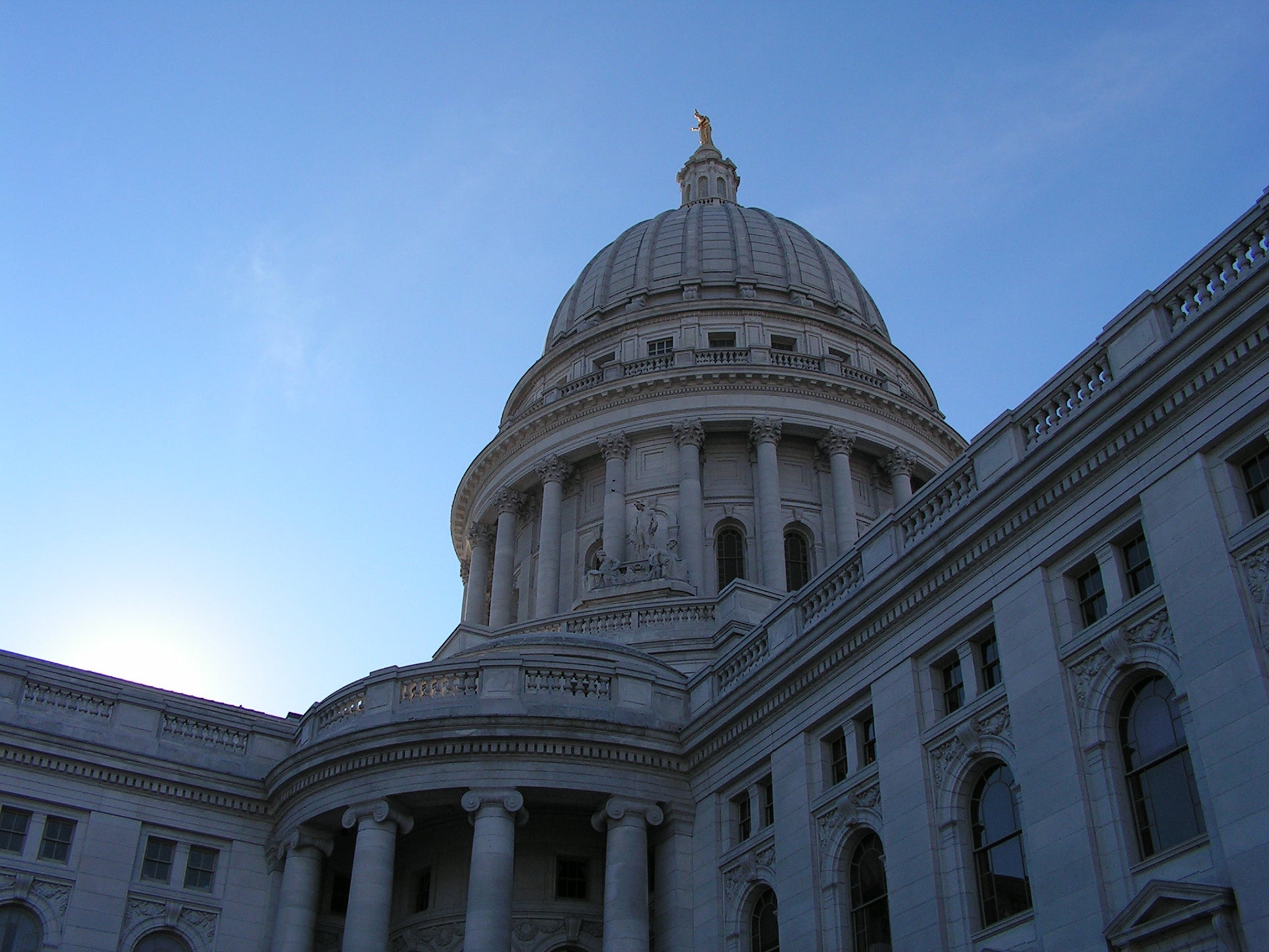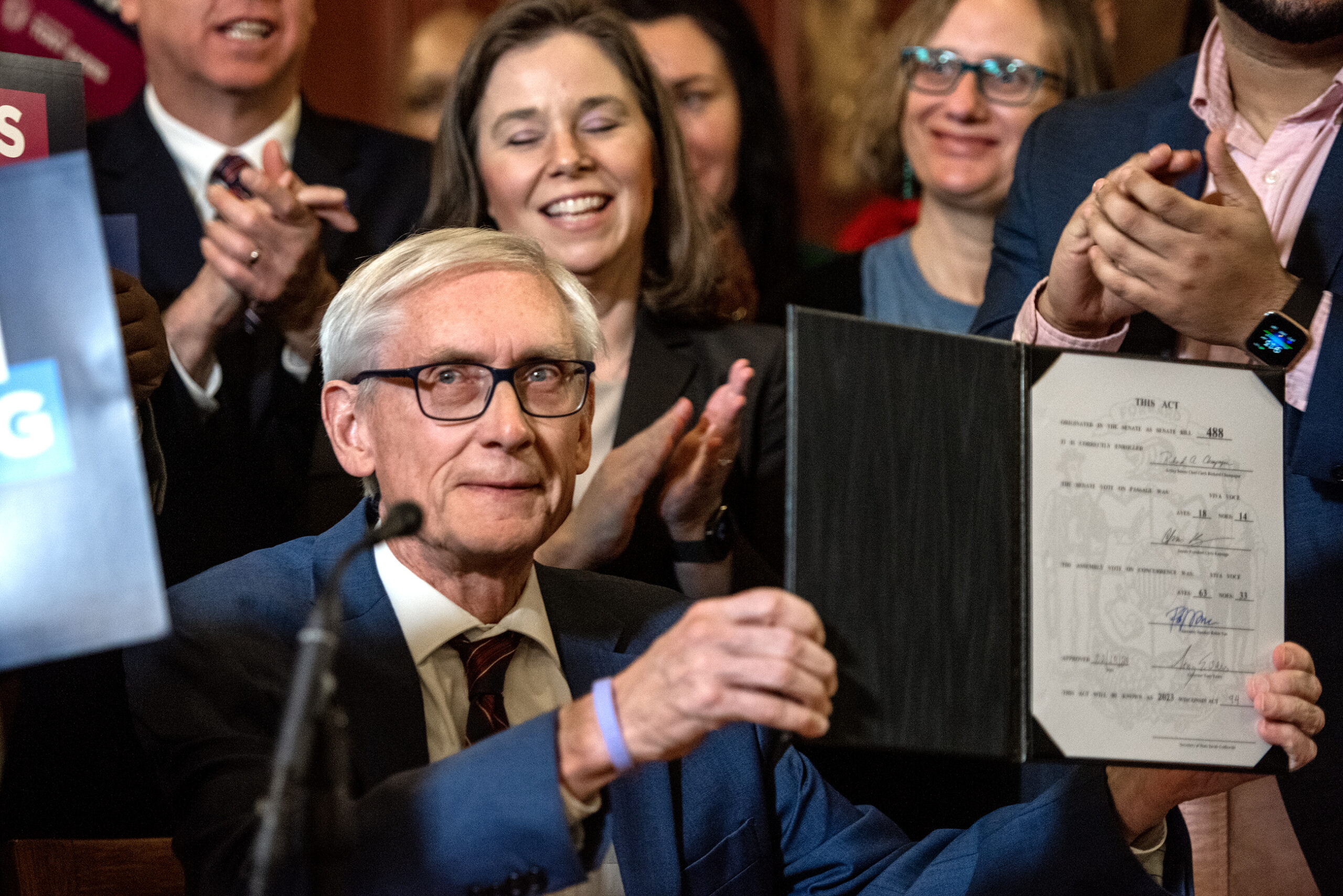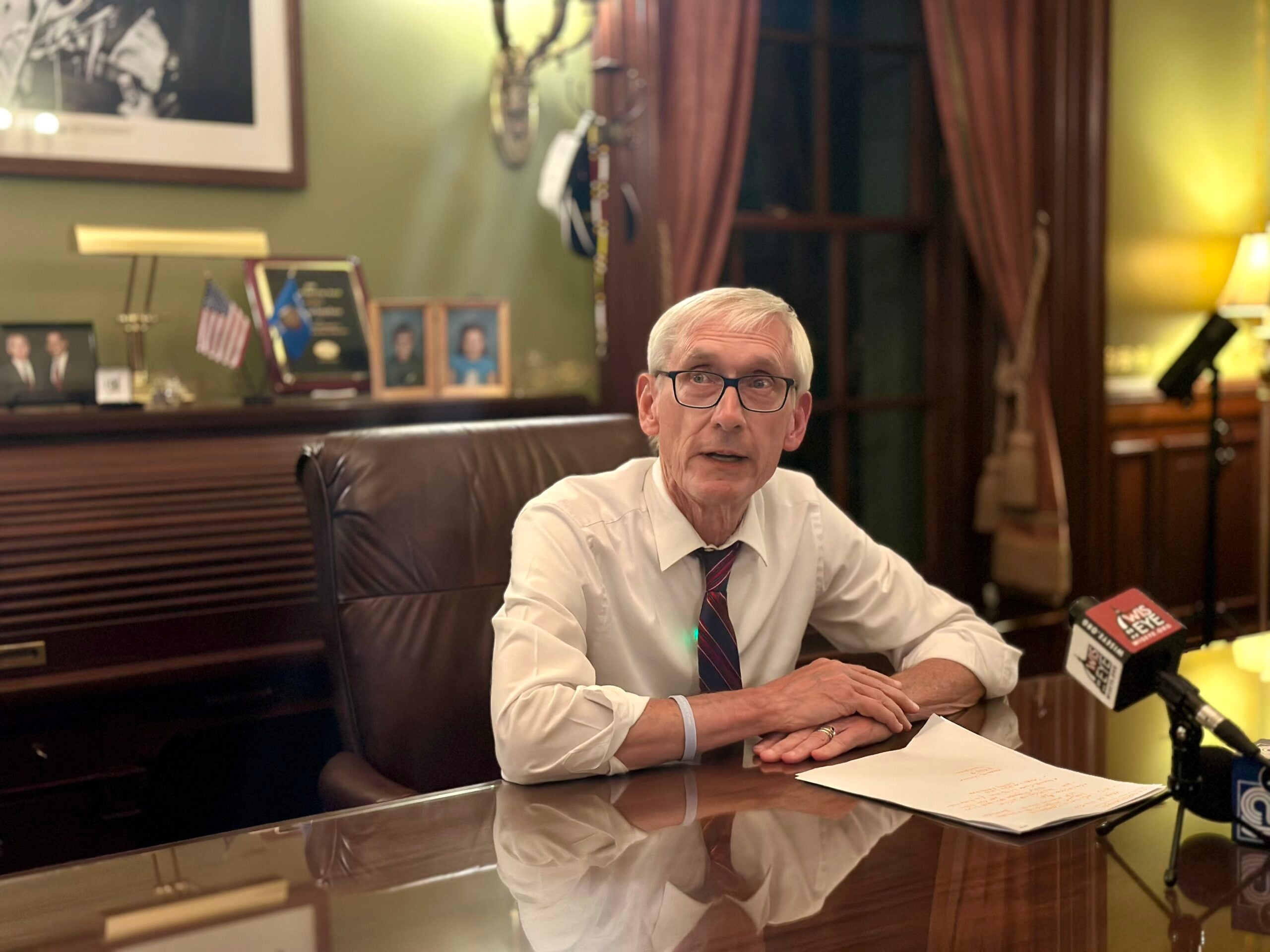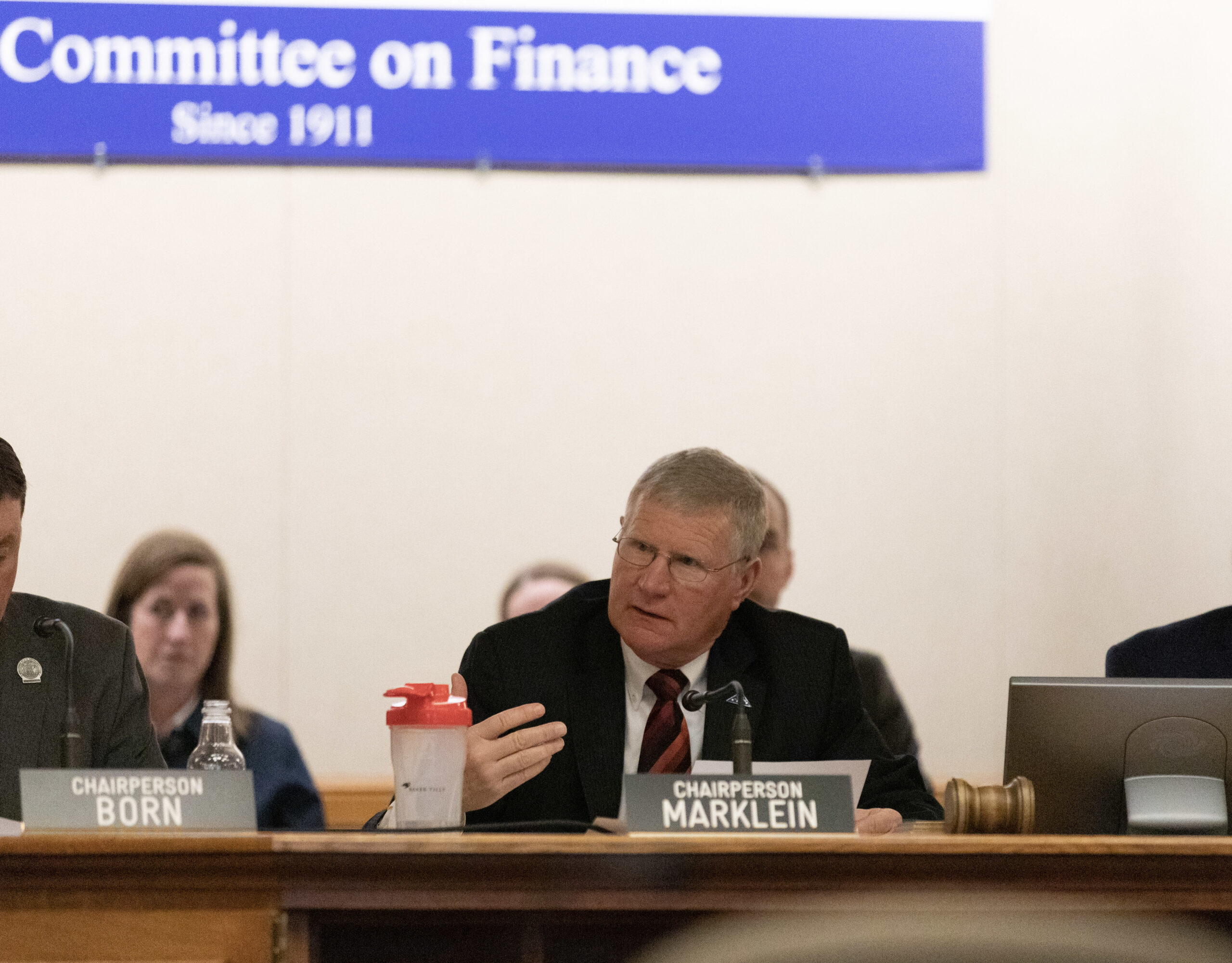Wisconsin’s next two-year spending plan is headed to Gov. Tony Evers’ desk.
The state Senate voted 17-16 Wednesday to approve the state budget, following hard on the heels of the Assembly’s approval late Tuesday evening.
The spending plan now moves to Evers’ desk. The governor, who holds one of the most powerful veto pens in the country, hasn’t said what changes he plans to make to the bill or if he will reject it entirely.
News with a little more humanity
WPR’s “Wisconsin Today” newsletter keeps you connected to the state you love without feeling overwhelmed. No paywall. No agenda. No corporate filter.
“I’ve said all along that the will of the people is the law of the land, and that’s what will be on my mind as I review the Legislature’s changes to our budget,” Evers tweeted after the vote.
The roughly $82 billion budget advanced by the GOP-controlled Legislature spends about $2 billion less than Evers requested and includes some notable departures from the governor’s spending plan.
Those departures include eliminating acceptance of more federal money to expand Medicaid, sharply scaling back the governor’s plans to increase K-12 education spending by $1.4 billion and bypassing a proposed gas tax increase.
Close Vote Within Republican Majority
The spending plan passed with a slim margin in the state Senate, where only two Republican senators could vote against the plan if it was to be approved. Republicans hold a 19-14 majority in the chamber and no Democrats supported the bill.
Two GOP state senators — Sen. Steve Nass, R-Whitewater, and Sen. David Craig, R-Big Bend — joined all Senate Democrats in voting against the budget. Both Nass and Craig have raised concerns about its overall level of spending, as well as increases to property taxes and vehicle title and registration fees included in the plan.
Property taxes would not increase more than $56 in the first year of the budget and $48 in the second, according to the Legislature’s nonpartisan budget office.
Nass and Craig were two of four senators who held up budget passage during the last round of state spending talks two years ago. One of the other four holdouts, Sen. Duey Stroebel, R-Saukville, said last week he would vote for this budget.
The last, Sen. Chris Kapenga, R-Delafield, said Wednesday morning he also planned to vote “yes.”
Stroebel and Kapenga voted “yes” Wednesday.
Kapenga’s Wednesday morning statement came shortly after Assembly lawmakers made a last-minute addition to the budget Tuesday evening that would allow for Tesla cars to be sold directly to consumers in Wisconsin, without a car dealership intermediary. That is something the senator had pushed for in previous legislation.
Kapenga owns a small online business that sells Tesla parts, but he told reporters Wednesday morning that allegations he will financially benefit from the law change are misleading “half-truths.”
Kapenga said he rebuilds Teslas as a hobby and sells salvage vehicles and spare parts he doesn’t need. As of Wednesday, the business had seven parts listed on eBay, ranging from $25 to $1,200.
“This does not bring in any profit, and if you add the value of my time and the cost of the vehicles, I could have purchased new ones for cheaper,” Kapenga said. “You can confirm that with my wife.”
The senator said allowing direct Tesla sales and service in Wisconsin would actually be detrimental to his operation.
Republicans Defend Spending Plan
During debate Wednesday, GOP leaders touted the budget as a responsible middle ground between Evers’ $83.4 billion budget proposal and their own conservative principles.
“This budget is a people’s budget,” said Sen. Alberta Darling, R-River Hills. “A ‘no’ vote on this budget doesn’t advance another opinion, it only rejects these investments for our state. And while Democrats may be symbolically voting ‘no’ today to show their support for Evers, a ‘no’ vote actually means schools, health care, education, infrastructure and job training remains stagnant.”
The budget includes a $500 million increase for K-12 education in Wisconsin, roughly $1 billion for construction projects on UW System campuses, $393 million in new revenue for state road projects and a $588 million increase for Medicaid and other state health programs.
The budget also cuts income taxes. Under the plan, the average taxpayer would save about $75 in the 2019 tax year and $136 in 2020, which would amount to a $457.6 million income tax cut overall.
The tax changes would be aimed most directly at low-income individuals and families.
Under current law, the lowest income tax bracket in Wisconsin pays a 4 percent tax rate; that would drop to 3.76 percent in the 2020 tax year. The second lowest tax rate, currently 5.84 percent, would decrease to 5.21 percent in 2020.
Senate Majority Leader Scott Fitzgerald, R-Junueu, released a statement after the budget’s passage, saying it “keeps Wisconsin headed in the right direction.”
“I’m confident that the plan maintains our state’s positive trajectory while taking steps forward in the areas outlined by the governor,” Fitzgerald said. “We’ve done our part now the governor must do his. I urge him to sign this bill.”
Democrats Continued Push For Evers’ Priorities
Democrats used debate time Wednesday to make a final push for a number of the governor’s proposals removed by GOP lawmakers, including acceptance of more federal money to expand Medicaid.
Evers has argued taking the expansion, which has been called a lynchpin of his budget, would save the state about $320 million over the next two years and bring more than $1 billion in additional federal money into Wisconsin.
The expansion would extend the Medicaid program to roughly 82,000 more Wisconsin residents by raising the program’s income ceiling from 100 percent of the federal poverty level to 138 percent.
Sen. Jon Erpenbach, D-Middleton, said not taking the expansion is “one of the dumbest things I have ever seen come out of this building.”
Sen. Fred Risser, D-Madison, agreed.
“It’s beyond logical comprehension that we don’t take the funds that are there,” Risser said. “Blind partisanship is the only reason I can think of.”
Other major elements of the budget proposed by the governor that were stripped by the Legislature’s Republican majority include:
legalizing medical marijuana in Wisconsin and eliminating civil and criminal penalties for possession of up to 25 grams of marijuana.
increasing Wisconsin’s minimum wage by $1 in January with subsequent 75 cent increases in each of the next three years before indexing the minimum wage to inflation in 2024.
creating a new nonpartisan redistricting commission that would reduce the power of lawmakers to draw their own district lines.
reinstating Wisconsin’s prevailing wage law for government construction projects.
offering state-issued driver’s licenses and ID cards to immigrants living in the country illegally.
repealing the so-called “dark store loophole” used by large retailers to reduce their local property tax burden.
Some of those proposals could reemerge in the Legislature as standalone bills. Lawmakers are expected to return to Madison this fall for additional legislative work.
Wisconsin Public Radio, © Copyright 2025, Board of Regents of the University of Wisconsin System and Wisconsin Educational Communications Board.







